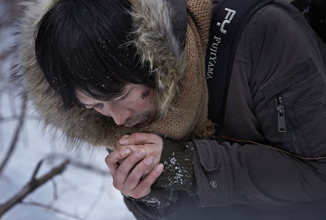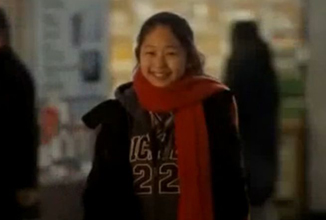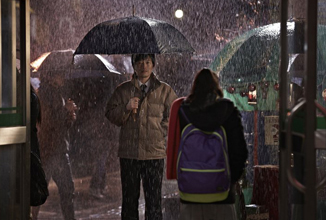"I only came because you wouldn't stop bothering me. This can't have anything to do with me...
I'm sure my daughter is safe with some of her friends... I'm really busy at work! I have production deadlines to meet, so I don't have time for this! Why should I have to ID a body that isn't my daughter? My little girl is safe!... My little girl is safe..."
Synopsis:
Since the passing away of his wife from cancer, Sang-hyeon (Jeong Jae-yeong) has buried himself in his job; regularly working insane hours and often drowning his sorrows in one bar or another late into the night in a vain effort to numb his pain. Consequentially, Sang-hyeon's relationship with his daughter Soo-jin (Lee Soo-bin) - with whom he lives alone - has also suffered; Soo-jin's daily interactions with her father having become little more than (almost grudging) passing pleasantries consisting largely of Sang-hyeon talking as Soo-jin is walking away.
However, Sang-hyeon's already cold, painful existence is soon to be utterly torn asunder when a work deadline prevents him from picking Soo-jin up after school and on her way home alone she is abducted, drugged, raped and murdered.
Utterly devastated, and with everyone he loves having been taken from him, Sang-hyeon determines to see those responsible for Soo-jin's death brought to justice but an anonymous text message telling him of an address where there is evidence relating to the case serves to set his life on a far darker course.
For, while Sang-hyeon is at the premises, one of the perpetrators returns to watch a video of Soo-jin's rape and in the blink of an eye Sang-hyeon's desperate desire for justice turns into an overpowering need for revenge...
Review:
Imagine if you will a bleak, icy woodland; a stark and hostile virtual wilderness barren save for towering trees (devoid of foliage) hemming in the area almost to the point of encroachment, they themselves seeming to be in a desperate struggle for survival barely managing to cling on to life.
It is into just such an unrelentingly harsh, unforgiving environment that we are taken to be introduced to Sang-hyeon - a dishevelled, almost frozen individual whose unshaven face is caked with ice, staring blankly at the ground - but while this subzero, (seemingly) desolate environment has certainly played its part in Sang-hyeon's obvious ongoing struggle for survival, as we are soon to learn he is a man broken far more psychologically by the very life that led him here than physically by his current surroundings.
Not only that, but (as we later learn) the fact that this seemingly unpopulated, desolate area is in reality in the midst of a popular ski resort teaming with happy holidaymakers could even be said to allow the environment to stand as an analogy to what Sang-hyeon's life has become - surrounded by people yet totally separated from them; alone in a cold, empty world where even the next step and breath are a struggle to take, though at this early stage such a comparison is, of course, yet to be made.
Following this scene as we are taken back in time to the period leading up to Soo-jin's murder, the above is gradually alluded to and, in tandem with the unfolding of the narrative itself, combines with a contrasting of the person Sang-hyeon was prior to her death - an individual who noticeably talks a lot about anything and everything aside from his feelings as a way, if you like, of hiding his pain from those around him and indeed himself - with the shadow of a man he becomes as a result of her abduction, rape and murder - tacit and so consumed by grief that no words could possibly express or indeed hide his feelings - to subtly and deftly allow 'Broken' to stand as a far more layered and emotion-driven work than the tale of retribution it would appear to be on a cursory glance.
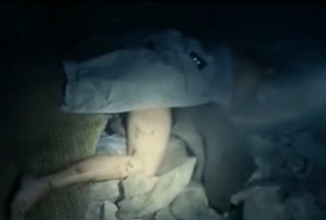 |
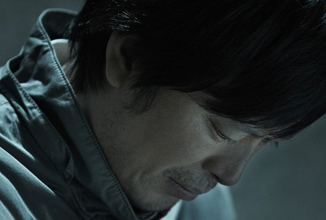 |
Revenge has long been a major staple of Korean films (and I'm aware that may well be the understatement of the decade) but while 'Broken' does indeed fit perfectly into the genre overall it also serves to underline a narrative element that to my mind has played a significant role over the years in making Korean cinema a force to be reckoned with on the world stage; that is the detailing of emotion within (often unspoken) character thoughts without the need for contrived dialogue driven exposition - depictions that mainstream Hollywood, for example, seems to have forgotten how, or been unable/unwilling, to achieve - thereby greatly increasing viewer empathy by means of often palpable humanity depicted in an absolutely natural and wholly believable manner at the same time as allowing topical social commentary to be referenced. Though the majority of the social issues in the case of 'Broken' are (clearly deliberately) stated rather than discussed, the film still stands alongside Korean cinematic tales that possess far more depth than the term 'Revenge Thriller' would imply.
However, even if you were to view 'Broken' as simply a dissection of retribution, the heartbreaking depiction of Sang-hyeon watching one of the perpetrators playing the (fairly graphic) video clip of Soo-jin's rape and death frankly cannot fail to ensure that each and every viewer will side wholeheartedly with this increasingly broken man, whether he stands as a father bereft of his daughter or indeed a vigilante set on a course of revenge and murder... and, of course, siding with a murderer raises thought-provoking questions of its own.
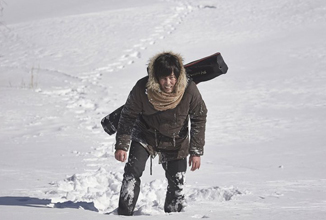 |
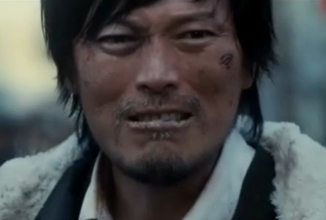 |
As many of you reading this will likely already be aware, 'Broken' is based on the Japanese novel 'Samayou Yaiba' by Keigo Higashino and though director Lee Jeong-ho changes some story elements to fit more closely with Korean-specific social issues (not least, making the perpetrators of the crime(s) against Soo-jin far younger in age than in the original story; thereby allowing the film to also fit with the numerous Korean cinema critiques of and references to the often less than severe punishments handed out to criminals who are minors) Higashino's spirit, if you will, can be felt throughout, nonetheless. As such, 'Broken' bears a number of similarities (in terms of narrative and character depth, overall tone and even cinematic pacing) with both 'White Night' (2009) and 'Perfect Number' (2012) - which were also based on Keigo Higashino novels - but far from being a criticism on my part, that fact serves to make this already nuanced film as successful a pulse pounding thriller as it is an emotive drama.
It could be said that 'Broken' does feature a number of crime thriller clichés - a jaded veteran cop unable to step past issues relating to an earlier case teamed with an enthusiastic rookie who has yet to learn that justice is not always as simple as right vs. wrong; a man pushed to revenge in spite of (and indeed because of) the law and its inadequacies; and even the whole story being based around the rape and murder of a child - but while all of these elements will have been seen by almost all Korean film fans on numerous previous occasions, they are so virtually ubiquitous in thrillers of this ilk that their inclusion can almost be taken more as read than seen as deliberately contrived and certainly in this case they don't detract from the overall narrative.
As a further note on the 'revenge' aspect of 'Broken', the first two main altercations that lead Sang-hyeon to violent retribution come as spontaneous (and instantaneous) reactions to situations he is almost forced into rather than being premeditated and specifically sought out acts of revenge per se. This idea carries through to both the conclusion of the overall story and the culmination of Sang-hyeon's individual character arc, added to further (and beautifully) by a hallucinatory scene in which Sang-hyeon talks with his dead daughter: Within this short and deeply poignant conversation the reasoning behind every one of Sang-hyeon's prior actions, and indeed the outcome of the final showdown that is yet to come, is deftly and touchingly shown for what it truly is. That is, the detailing of one man's search for closure and a way to bring an end to heart-wrenching pain at any cost rather than the pursuit of vigilante justice down the barrel of a shotgun.
Cast:
Jeong Jae-hyeon, Lee Sung-min, Seo Joon-yeong, Lee Soo-bin
Directed by:
Lee Jeong-ho
Summary:
While on a cursory glance ‘Broken’ would appear to be yet another example to be added to the utter plethora of Korean cinematic tales of revenge and retribution, take a closer look and you will find the detailing of one man's search for closure and a way to bring an end to heart-wrenching pain far more than any pursuit of vigilante justice down the barrel of a shotgun.
'Broken' (방황하는 칼날) / 2014 / directed by Lee Jeong-ho
|


